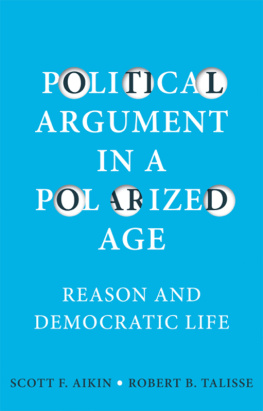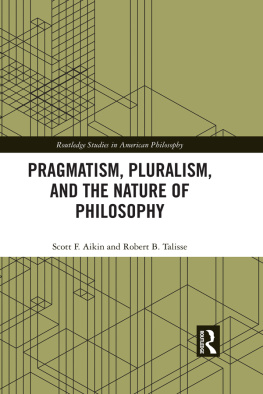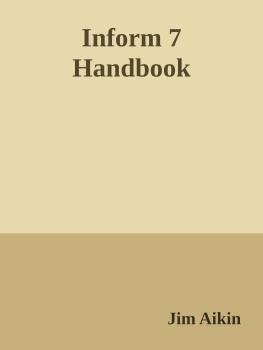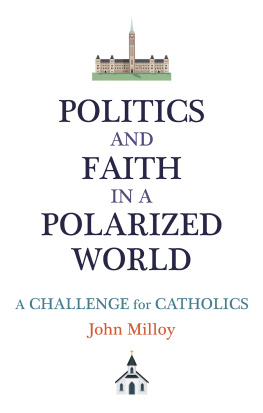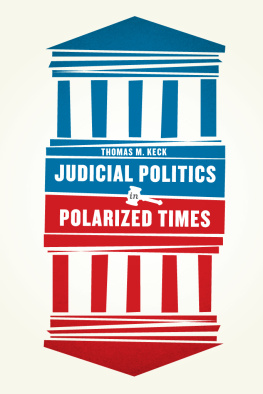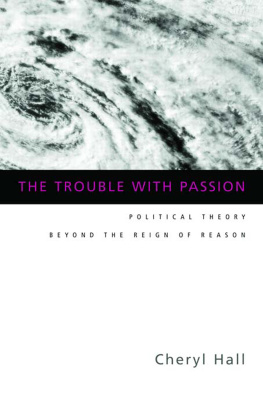Scott F. Aikin - Political Argument in a Polarized Age: Reason and Democratic Life
Here you can read online Scott F. Aikin - Political Argument in a Polarized Age: Reason and Democratic Life full text of the book (entire story) in english for free. Download pdf and epub, get meaning, cover and reviews about this ebook. year: 2019, genre: Politics. Description of the work, (preface) as well as reviews are available. Best literature library LitArk.com created for fans of good reading and offers a wide selection of genres:
Romance novel
Science fiction
Adventure
Detective
Science
History
Home and family
Prose
Art
Politics
Computer
Non-fiction
Religion
Business
Children
Humor
Choose a favorite category and find really read worthwhile books. Enjoy immersion in the world of imagination, feel the emotions of the characters or learn something new for yourself, make an fascinating discovery.
- Book:Political Argument in a Polarized Age: Reason and Democratic Life
- Author:
- Genre:
- Year:2019
- Rating:5 / 5
- Favourites:Add to favourites
- Your mark:
- 100
- 1
- 2
- 3
- 4
- 5
Political Argument in a Polarized Age: Reason and Democratic Life: summary, description and annotation
We offer to read an annotation, description, summary or preface (depends on what the author of the book "Political Argument in a Polarized Age: Reason and Democratic Life" wrote himself). If you haven't found the necessary information about the book — write in the comments, we will try to find it.
Political Argument in a Polarized Age: Reason and Democratic Life — read online for free the complete book (whole text) full work
Below is the text of the book, divided by pages. System saving the place of the last page read, allows you to conveniently read the book "Political Argument in a Polarized Age: Reason and Democratic Life" online for free, without having to search again every time where you left off. Put a bookmark, and you can go to the page where you finished reading at any time.
Font size:
Interval:
Bookmark:

Scott F. Aikin and Robert B. Talisse
polity
Copyright Scott F. Aikin and Robert B. Talisse 2020
The right of Scott F. Aikin and Robert B. Talisse to be identified as Authors of this Work has been asserted in accordance with the UK Copyright, Designs and Patents Act 1988.
First published in 2020 by Polity Press
Polity Press
65 Bridge Street
Cambridge CB2 1UR, UK
Polity Press
101 Station Landing
Suite 300
Medford, MA 02155, USA
All rights reserved. Except for the quotation of short passages for the purpose of criticism and review, no part of this publication may be reproduced, stored in a retrieval system or transmitted, in any form or by any means, electronic, mechanical, photocopying, recording or otherwise, without the prior permission of the publisher.
ISBN-13: 978-1-5095-3652-8
ISBN-13: 978-1-5095-3653-5(pb)
A catalogue record for this book is available from the British Library.
Typeset in 10 on 16.5pt Charter
by Fakenham Prepress Solutions, Fakenham, Norfolk NR21 8NL
Printed and bound in the UK by CPI Group (UK) Ltd, Croydon
The publisher has used its best endeavours to ensure that the URLs for external websites referred to in this book are correct and active at the time of going to press. However, the publisher has no responsibility for the websites and can make no guarantee that a site will remain live or that the content is or will remain appropriate.
Every effort has been made to trace all copyright holders, but if any have been overlooked the publisher will be pleased to include any necessary credits in any subsequent reprint or edition.
For further information on Polity, visit our website: politybooks.com
We are two remarkably fortunate authors. For one thing, we work at a university that enthusiastically supports our scholarly work and collaboration. Vanderbilt University has been very good to us. Deans John Geer, Andre Christie-Mizell, and Kamal Saggi have all provided institutional opportunities for our research, writing, and intellectual development. And our colleagues in the Vanderbilt Philosophy Department have been insightful respondents and supporters. In particular, we wish to thank William James Booth, Matthew Congdon, Idit Dobbs-Weinstein, Lenn E. Goodman, Diana Heney, Michael Hodges, John Lachs, Karen Ng, Kelly Oliver, Paul Taylor, Jeffrey Tlumak, John Weymark, and Julian Wuerth. We also have had excellent students who were thinking along with us as we completed this book. Among these are Fiacha Heneghan, Tempest Henning, Alyssa Lowery, Lisa Madura, Takunda Matose, and Lyn Radke. Moreover, we are fortunate enough to belong to a rich and vibrant intellectual community of people thinking hard about many of the same issues that we regularly grapple with. We have learned a great deal from Jason Aleksander, Jody Azzouni, Heather Battaly, Erin Bradfield, Kimberley Brownlee, Steven Cahn, Gregg Caruso, John Patrick Casey, Caleb Clanton, Andrew Cling, Candice Delmas, Jeroen de Ridder, Ian Dove, Elizabeth Edenberg, David Estlund, Andrew Forcehimes, Gerald Gaus, David Godden, Sandy Goldberg, David Miguel Gray, Hannah Gunn, Michael Hannon, Michael Harbour, Nicole Hassoun, David Hildebrand, Michael Hoppman, Andrew Howat, Catherine Hundleby, Klemens Kappell, David Kaspar, Chris King, Holly Korbey, Helene Landemore, Michael Lynch, Mason Marshall, Amy McKiernan, Joshua Miller, Cheryl Misak, Jonathan Neufeld, C. Dutilh Novaes, John OConnor, Jeanine Palomino, John Peterman, Yvonne Raley, Brian Ribeiro, Regina Rini, Allysson V.L. Rocha, Luke Semrau, Harvey Siegel, Walter Sinnott-Armstrong, William O. Stephens, Katharina Stevens, Alessandra Tanesini, Rob Tempio, Lawerence Torcello, Kevin Vallier, and Leif Wenar. We should hasten to add that many of the people weve thanked here should not be blamed for our views and errors, as many of the people weve thanked here have disagreed with us most forcefully.
Democracy in Dark Days
This is not another how to save democracy book. Perhaps you are familiar with that type of book the author laments the decline of some democratic norm, intones gravely about where the current trajectory takes us, and then outlines a set of fixes. There is, unsurprisingly, a small industry of books that follow this formula. They sell. They function as a kind of self-help for the political class. Now, thats not a bad thing by any means, but we think there is a false premise behind it all. Democracy cant be fixed.
So this clearly isnt a book about how to save democracy. What is it, instead? Well, its not a case against democracy, either. Just because democracy cant be fixed, it doesnt follow that we should do away with it. This is because doing away with democracy requires that we put something else in its place, something that theres sufficient reason to think is superior to democracy. But this comparative work is fraught. Notice that the relevant comparison is not between real-world democracy and some idealized nondemocratic alternative. Instead, the relevant comparison is between democracy as it presently functions and some envisioned alternative as it would function were it instated. When the comparison is performed properly, democracy comes out on top. So this isnt an anti-democracy book; we think there is no better political arrangement than democracy, even when it is functioning poorly.
This isnt a saving democracy book, and its not a down with democracy book. So what is it? Well, its complicated, but thats what happens when you ask tough questions that do not admit of simple answers. In fact, we hold that one of the problems with democracy is that it encourages citizens to expect there to be simple answers to complicated political questions. Hence the popularity of the two genres we have mentioned; the literature of both saving democracy and down with democracy is driven by the demand for easy answers.
Still, something should be said at the start about what this book is about. The view we will present can be sketched as follows. We understand democracy to be the proposal that a stable and decent political order can be sustained by equal citizens who nonetheless disagree, often sharply, about the precise shape their collective life should take. On this view, political disagreement among political equals is central to democracy. Disagreements of this kind are the engine of collective self-government. However, the practices associated with political disagreement and the freedoms guaranteed to citizens that enable them to engage in political argumentation particularly, freedoms of conscience, expression, and association create the conditions under which the democratic citizenry fractures into hostile and opposed factions. For reasons we will explain in these pages, political factions have a tendency to transform their members into polarized extremists who grow incapable of seeing their political opponents as fellow citizens. Yet maintaining a commitment to the political equality of our political opposition is the central demand of the democratic ethos, the ethos of the democratic citizen.
Note the tragic irony. Our enactment of democratic citizenship leads to the kind of polarization that dismantles our democratic capacities. We recognize the central democratic freedoms precisely because collective self-government among equals needs citizens to deliberate and argue together about matters of public concern. But in order to argue well together, citizens must be able to access and process the reasons and evidence that are relevant to their disputes; and they must
Next pageFont size:
Interval:
Bookmark:
Similar books «Political Argument in a Polarized Age: Reason and Democratic Life»
Look at similar books to Political Argument in a Polarized Age: Reason and Democratic Life. We have selected literature similar in name and meaning in the hope of providing readers with more options to find new, interesting, not yet read works.
Discussion, reviews of the book Political Argument in a Polarized Age: Reason and Democratic Life and just readers' own opinions. Leave your comments, write what you think about the work, its meaning or the main characters. Specify what exactly you liked and what you didn't like, and why you think so.

